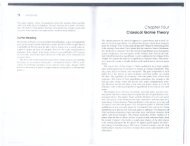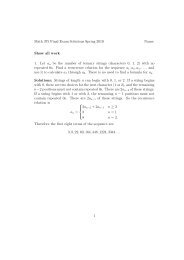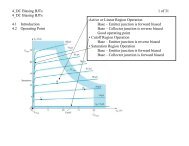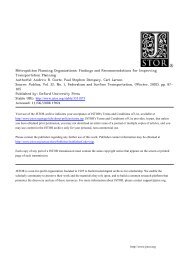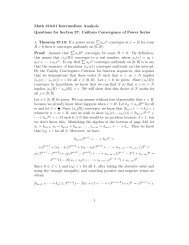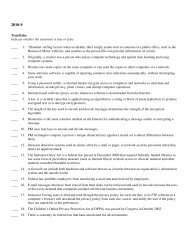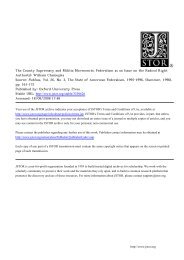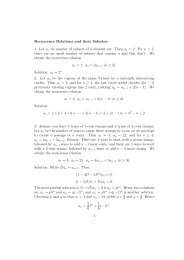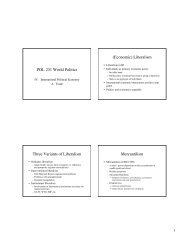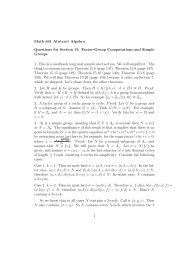Clemons and McBeth - MavDISK
Clemons and McBeth - MavDISK
Clemons and McBeth - MavDISK
You also want an ePaper? Increase the reach of your titles
YUMPU automatically turns print PDFs into web optimized ePapers that Google loves.
54<br />
bothersome psychological discomfort called cognitive dissonance by rejecting facts that do<br />
not fit our preconceived worldview.<br />
The Mismeasure of Man is rich with examples of contorted logic, number finagling, <strong>and</strong><br />
biased decisions about including <strong>and</strong>/or excluding evidence rather than changing our presupposed<br />
views. For example, Frenchman Paul Broca, who believed that brain size correlated with<br />
intelligence, made all sorts of adjustments to explain away evidence that Germans had bigger<br />
brains than did the French (including the very real factor of brain size relating strongly to body<br />
size). Yet when "mis-measuring" women, he felt no need to correct for such factors (not even<br />
for body size), stating that because we know that women are, on average, not as intelligent as<br />
men,we can thenconcludethat part of the brain sizedifferenceis due to body size <strong>and</strong>part to<br />
"her intellectual inferiority" (Gould, 1996, pp. 121-137). Interestingly, while Gould discusses<br />
some fraud by researchers, mostly he discovered inadvertent <strong>and</strong> unconscious bias.<br />
We surrender to wishful thinking <strong>and</strong> hubris <strong>and</strong> reject results too catastrophic to swallow<br />
as improbable. We stay the course due not to rationality, but to sunk costs <strong>and</strong> the selfdeception<br />
that historian Barbara Tuchman called "wooden-headedness." Wooden-headedness<br />
"consists in assessing a situation in terms of preconceived fixed notions while ignoring or<br />
rejecting any contrary signs. It is acting according to wish while not allowing oneself to be<br />
deflected by the facts" (1984, p. 7).<br />
Some believe that as humans we, like other animals, respond instinctively (not rationally)<br />
to perceived territorial threats. Clearly, as humans, there are rationality problems based on<br />
physical limitations. People react intuitively, emotionally, <strong>and</strong> irrationally. Our memories falter;<br />
we tire; our intelligence is not unbounded; <strong>and</strong> we are sometimes aggressive <strong>and</strong> sometimes<br />
docile, but never purely rational.<br />
One of the most famous <strong>and</strong> powerful critiques of the rational-comprehensive model came<br />
from Herbert Simon, who we discussed in the previous chapter. Simon stated that this view of<br />
humans attributed to them "a preposterously omniscient rationality" with "little discernible<br />
relation to the actual or possible behavior of flesh-<strong>and</strong>-blood human beings" (1976, p. xxvii).<br />
In other words, although he sought to rationalize decision making, Simon argued that we<br />
practice bounded rationality. That is, we do not consider every possible alternative <strong>and</strong> all attendant<br />
consequences, but rather latch on to the first satisfactory solution we come to. He calls<br />
this satisficing. Humans "satisfice because they have not the wits to maximize" (p. xxviiiemphasis<br />
in the original).<br />
He notes that "our perceptions capture only a drastically simplified model of the buzzing,<br />
blooming confusion that constitutes the real world" (p. xxix) <strong>and</strong> that we ignore "the interrelatedness<br />
of all things (so stupefying to thought <strong>and</strong> action)" <strong>and</strong> instead rely on "relatively simple<br />
rules of thumb that do not make impossible dem<strong>and</strong>s upon" our intellectual capacity (p. xxx).<br />
A.nalytical Problems As you can see, the analytical problem of complexity contributes<br />
to the human factor problem. Complexity, problems with prediction, problems that relate to<br />
the precious commodity of time, <strong>and</strong> problems that relate to data, represent the key analytical<br />
problems.<br />
Today, complexity is widely recognized as a central problem of analysis. Hans Morgenthau,<br />
the premier realist scholar who explained how to underst<strong>and</strong> foreign policy, argued that<br />
"The first lesson the student of international politics must learn <strong>and</strong> never forget" is complexity<br />
(1993, p. 22). Problem situations are interdependent <strong>and</strong> changing rapidly. The problems<br />
tackled are often vaguely defined, immense <strong>and</strong> extremely difficult problems, like poverty,<br />
racism, global warming, or teenage pregnancy.<br />
PARTI . THEORY AND PRACTICE CHAPTER3 . CRITlQUES OF THE RATIONAL ApPROACH 55<br />
Explaining why they believe that the incremental approach, not the rational approach,<br />
dominates in the real world, Braybrooke <strong>and</strong> Lindblom help characterize compleJCity.They<br />
note that we face "a cluster of interlocked problems with interdependent solutions" (1970, p. 54)<br />
<strong>and</strong> point out that the problems are often not clear; instead there is just a sense that "something<br />
needs to be done" (p. 57). Lofty, vacuous, conflicting, <strong>and</strong> nondelineated goals, often<br />
too broad to operationalize, can leave policy analysts <strong>and</strong> decision makers without a guiding<br />
star. (What is the public interest? How do we define literate? What is safe <strong>and</strong> affordable housing?<br />
How do we measure education?)<br />
The gist of the complexity argument is that the problems we face are so difficult, so undefined,<br />
so complicated, <strong>and</strong> so interrelated that they defy the utopian rational-comprehensive<br />
approach. Moreover, the specialization, simplification, <strong>and</strong> cognitive structures we apply to<br />
make the problems fit our intellectual scale can be liabilities as we try to solve complex problems.<br />
The great uncertainty that the chaotic world represents; the vast <strong>and</strong> tumultuous imaginable<br />
potential outcomes, occasionally carrying life-<strong>and</strong>-death consequences; the unknowable<br />
factors; <strong>and</strong> the imperfect anticipation of unintended consequences are all part <strong>and</strong> parcel of<br />
the analytical limitations on prediction <strong>and</strong> rationality.<br />
Rationality would require that future results be foreseen (i.e., be known accurately). Yet,<br />
clearly that is not possible no matter how deeply we peer into our crystal balls. Indeed,<br />
humans often spend inordinate amounts of time <strong>and</strong> money gathering "facts" in the deluded<br />
belief that the decision will make itself if we only can accumulate enough facts, when, in fact,<br />
the limits on what is gatherable <strong>and</strong> comprehensible are severe, <strong>and</strong> the reality is that value<br />
questions will still need to be resolved. Recent scientific studies on cognition, popularized by<br />
books like Blink (Gladwell, 2007) <strong>and</strong> Gut Feelings (Gigerenzer, 2007) have suggested that<br />
simple rules of thumb, less information, <strong>and</strong> snap judgments based on gut instincts tend to<br />
work better than the rational model.<br />
Whether it is human nature, or a reflection of our political culture, most people in this<br />
country both recognize that there are problems in society <strong>and</strong> government <strong>and</strong> believe that<br />
optimal solutions to those problems must exist. But once we start seriously examining social<br />
problems like poverty, drug use, crime, health care, illegal immigration, or terrorism, it almost<br />
immediately becomes evident that simple solutions do not exist for complex, multicausal<br />
problems. In fact, serious study may reveal that we do not even know exactly what the problem<br />
is. Did the war in Iraq help or hinder the war on terror? What causes terrorism? What would<br />
diminish it? How serious is international terrorism compared with other risks?<br />
Moreover, as we study these issues carefully, we may see them as more complex. That is,<br />
gaining a serious underst<strong>and</strong>ing does not necessarily make the problem seem clear, the solutions<br />
obvious, <strong>and</strong>-in fact-the answers you determine may appear politically implausible.<br />
For example, perhaps the solution would not be palpable to the powers that be or run counter<br />
to the dominant social paradigm. And, certainly, different people, people in different roles<br />
<strong>and</strong> organizations, will come to different problem definitions <strong>and</strong> solutions.<br />
Further, no one group or individual is likely to be able to derive a solution. This is why it is<br />
important to look at the shoes under the table. The only possible solution may have to involve the<br />
participation <strong>and</strong> buy in of diverse groups of people <strong>and</strong> interests, <strong>and</strong> it may take a verylong time.<br />
This is symptomatic of what Horst Rittel <strong>and</strong> Melvin Webber (1973) called wickedproblems.<br />
Wicked problems do not have bumper-sticker solutions. They do not have a single, optimal<br />
solution. And, the issues <strong>and</strong> possible solutions only become clear when a diverse group<br />
of participants with differing values, interests, <strong>and</strong> points of view come together to deal with<br />
them (which can also change the definition of what the problem is). In short, wicked problems



